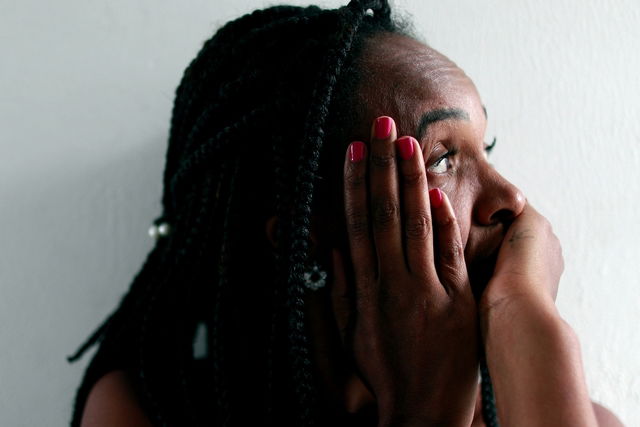An anxiety attack can leave you feeling very worried, nervous and insecure, as if something bad that is out of your control can happen at any moment. This feeling is usually triggered by something specific, like writing a test, having to do a presentation or after the loss of someone close.
During an anxiety attack, you may also feel your heart racing, tingling in the body and even lightheadedness.
When an anxiety attack starts to erupt, you can try closing your eyes and breathing slowly and deeply for several minutes. This can help your heart rate and respiration rate to slow down to normal levels.

Common symptoms
The most common symptoms of an anxiety attack include:
- Uncontrollable feeling that something bad is about to happen
- Irrational thoughts
- Increased heart rate
- Tingling in the body
- Lightheadedness
- Chest pain
- Excessive sweating
- Nausea
- Shaking
- Difficulty breathing
Normally, these symptoms appear during a situation that is happening in the moment or will be happening in the future (like doing a presentation in public or dreading a certain conversation with someone).
These symptoms arise due to an increase in adrenaline, which is a hormone that circulates in your bloodstream. It is normal for adrenaline levels to rise during stressful moments. If these symptoms emerge frequently, however, it may be a sign of generalized anxiety disorder, which should be treated with psychotherapy and, in some cases, medication.
How to stop an anxiety attack
Approaches to coping with your anxiety attack depend on the severity of your symptoms and on how frequently they happen. It is always best to be evaluated by a psychologist. However, there are some ways you can help to alleviate the symptoms of an anxiety attack:
- Breathe slowly, inhaling through the nose and exhaling through the mouth
- Drink a calming tea, like camomile, valerian or linden tea.
- Get our emotions out, whether it be by screaming, crying or talking it out with someone you trust
- Rest and turn off your mind by avoiding stimulating activities like browsing on your phone or watching TV
- Perform a physical activity you enjoy, as this can help you to forget the stressful situation triggering your anxiety, as well as stimulate the production of neurotransmitters that promote wellness and relaxation
- Take your prescription medication as indicated by your psychiatrist
When an anxiety attack happens for the first time, or if you are unsure if you are having an anxiety attack, it is important to seek medical attention so that other more serious conditions (like a heart attack) can be ruled out .
If anxiety attacks happen frequently, you should seek psychological counseling. Psychotherapy can help to identify triggers causing your anxiety, and help you to develop coping mechanisms to deal with those situations, so that your symptoms can disappear more quickly.
How to differentiate an anxiety attack from a heart attack
Anxiety attacks and heart attacks can present very similarly, therefore it is important to know how to distinguish the symptoms of each condition. Knowing the difference will also help you to feel less worried about what might be happening to your body.
Generally, an anxiety attack is usually linked to a specific situation that triggers symptoms, like going through a break-up, getting into a fight with someone, or public speaking. Chest pain is usually less intense with an anxiety attack in comparison to a heart attack. Also, the symptoms of an anxiety attack usually disappear after some time and the body will start to relax. With a heart attack, symptoms will worsen.
